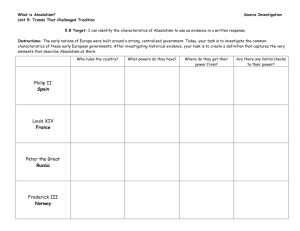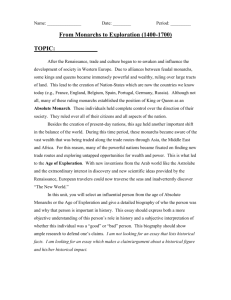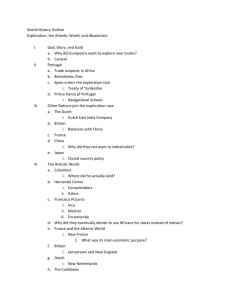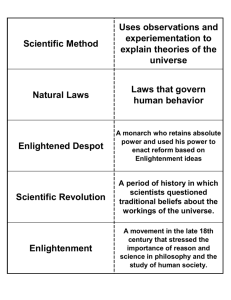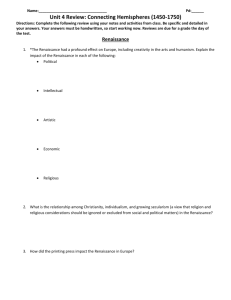Rise_of_Nation_State
advertisement
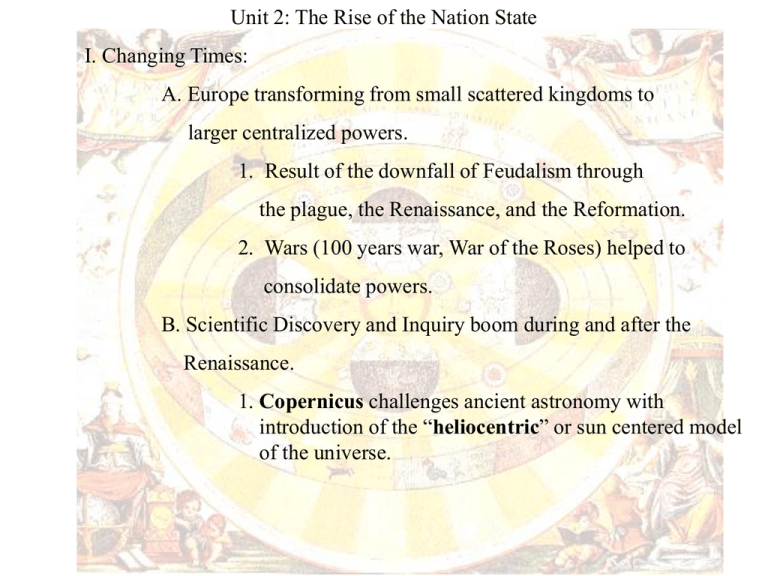
Unit 2: The Rise of the Nation State I. Changing Times: A. Europe transforming from small scattered kingdoms to larger centralized powers. 1. Result of the downfall of Feudalism through the plague, the Renaissance, and the Reformation. 2. Wars (100 years war, War of the Roses) helped to consolidate powers. B. Scientific Discovery and Inquiry boom during and after the Renaissance. 1. Copernicus challenges ancient astronomy with introduction of the “heliocentric” or sun centered model of the universe. Name Birth / Death Nicolaus Copernicus 2/19/1473 to 5/24/1543 First astronomer to formulate a scientifically based heliocentric cosmology that displace Earth from the center of the universe. (catholic cleric) Copernican Revolution Johannes Kepler 12/27/1571 to 11/15/1630 Mathematician, astronomer, inventor- studied life and death of stars- questioned the unchangeable perfection of the heavensinvented an improved the refracting telescope. Dying Stars Galileo Galilei 2/15/1564 to 1/08/1642 Father Science Francis Bacon 1/22/1561 to 4/9/1626 Physicist, astronomer, “Father of Modern Science.” Studied motion of uniformly accelerated objects, discovered moons of Venus and sunspots- reaffirmed heliocentric universe- Spanish Inquisition labeled heretic Catalyst of scientific revolution. Wrote that “printing, gunpowder, and the compass” would change the world- founder of the scientific method. Rene Descartes 3/31/1596 to 2/11/1650 Founder of modern Philosophy- “I think, therefore, I am” Wrote “Passions of the Soul” on emotions –also worked in mathematics combining algebra and geometry Modern philosophy Andreas Vesalius 12/31/1514 to 10/15/1564 Anatomist, physician; founder of modern human anatomy. Published “The Fabric of the human body” were he painstakingly mapped the vernacular system. Modern Medicine 1/4/1643 to 3/31/1727 Physicist, mathematician: described universal gravitation and laws of motion, laying groundwork for classical mechanics and scientific universe-removed doubt about heliocentrism. Law Gravity 1024/1632 to 8/30/1732 Scientist, “Father of Microbiology” invented modern microscopefirst to identify single celled organisms. Created over 200 microscopes. Microbiology 1510 to 12/20/1590 Surgeon, “father of surgery” leader in battlefield medicineInvented cauterization of arteries and documented phycosis of “phantom pain”. –Obstetrics – Podalic version to save unborn child. Administered the first human blood transfusion saving a 15 year old boy with nine ounces of lamb’s blood Surgery Isaac Newton Anton van Leeuwenhoek Ambroise Pare Jean-Baptiste Denys 1640 to 1704 Contribution/ Invention One or Two words That summarizes importance Scientific Method Blood Transfusion 2. Galileo: developed an astronomical telescope: supported the “heliocentric” universe. Tried before the Inquisition for his “heresies” challenging the traditional Christian “earth centered” model of the universe. 3. Changes in scientific thought and inventions paved the way for exploration of the physical universe and discovery of new lands – forever changing the medieval mindset for a new age. C. Exploration: Changes traditional world views. 1. European explorers of the 1400’s began a dramatic new age of exploration – spurred on by motivation for trade and wealth. 2. Portuguese explorers such as Prince Henry and Vasco da Gamma mapped the coasts of Africa and found routes to India, opening the way for trade and slavery. 3. Columbus sails West in 1492 and discovers previously unknown continents to Europeans opening way for discovery and colonization. 4. More accurate maps, a better compass, and the use of astrolabesan astronomical tool – helped exploration circumnavigate the globe. II. The Rise of the Nation State: A. Changing world necessitates changing ruling order: 1. Exploration opened the door for new lands and riches previously unknown in Europe in the centuries before the 1400 and 1500’s. 2. Necessitated the rise of new governmental regimes to make decisions on a broad base both at home and abroad. 3. Feudalism was gone and strong central powers governing a unified country known as a “Nation State” was the new ruling order. 4.“Absolutism” – meaning complete authority over the government and people - was exercised by the monarchs of the age was the new ruling order. Click on Square to show clip on “The Nation State” B. What is Absolutism? 1. Monarch: Form of government where power is lodged with an individual, who is head of state, often for life. 2. Divine Right: Absolute Monarchs believed that God had appointed them to rule. 3. Autocracy: The opposite of “Democracy: were people have a voice”; Power lies in the hands of a few, and the people have no power. C. Absolute Monarchs arrive: 1. Hapsburg Empire dissolves: Charles V, trying to rule the remnants of the Holy Roman empire, exhausted from war and trying to rule the vast empire abdicates thrown and enters a monastery. “Versailles” 2. Empire is divided between his brother Ferdinand; who would rule what became known as the Austrian Empire; and his son Phillip II, who would rule Spain. 3. Phillip II rules Spain for 42 years with the help of silver and gold from colonies in the Americas making Spain the foremost power in Europe. “Sun King” 4. Queen Elizabeth I: ruled for 45 years and in 1588 defeated the Spanish Armada (130 ships and 20,000 men sent to destroy the Protestant Queen) making England the prominent power in Europe for the next 200 years. 5. Louis XIV: rises to power in France at the age of 5, believed in his divine right to rule; stating “I am the State.” Built Versailles palace as a symbol of his power; ruled for 72 years. http://www.etss.edu/hts/hts3/info1.htm III. Absolutism’s Legacy A. Absolute leaders became icons of a Nation States image of itself – Through controlling all aspects of government. B. Rulers maintaining power for long periods of time provided stability and direction for these nation states. C. After more than two centuries of Absolute rulers, in an age of changing ideas in science and philosophy, rulers begin to overstep their support. Quote: “The state of Monarchy is the supremest thing upon earth; for kings are not only God’s lieutenants upon earth and sit upon God’s throne, but even by God himself they are called gods …Kings are justly called gods for that they exercise a manner or resemblance of Divine power upon earth… And to the King is due both the affection of the soul and the service of the body of his subjects.” -James I: King of England 1603 D. The enlightenment brought about new ideas of human rights, and thought and would spell the end of “Absolutism”, but the continuation of the Nation State under more representative governments. Flow chart: Middle Ages: Renaissance: Expand in each box a brief explanation of what they were: Reformation: Scientific Revolution: Age of Exploration: Rise of the Nation State:

